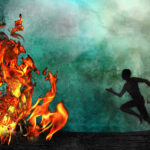Richard Ammon
GlobalGayz.com
August 15, 2009
Regarding the point made in the previous blog post about the New York Times story on party-time gay males in Lebanon, a more realistic portrait of gay Lebanon was drawn by a lesbian in the book ‘Bareed Mistas3jil’ published by Meem . (2009; P43)
I think this worried description (below) is what a close investigation of the inside lives of most LGBT Lebanese would discover. Unfortunately this furtive lesbian population is difficult to access by a foreign journalist who visits Lebanon – or any country – on a short visit. Unless there are deep and trusted connections, Muslim gays – especially lesbians – do not offer their lives for examination. Even the women who complied the stories and edited the book did not at first have an easy time finding willing people to share their stories.
It took three years to finish the project, and what an interesting period of time elapsed. From 2005 to 2008 “we witnessed the rise of remarkable lesbian community that brought new meaning to queer solidarity, understanding and grassroots activism, and it became clearer to us that these were they people whose stories needed to be heard.”
So the book happened within a matrix of expanding awareness – probably kicked loose by the notorious gay marriage issue in the west – as well as increased courage and close support connections (virtual and real) with other right groups. This first publication of women’s voices comes at a critical time when courage and confidence are developing a ‘critical mass’ of urgency and possibility in the Lebanese culture. “Things are a-changing,” but not all things and not all now.
The portrait from the lesbian expresses the following:
“It is completely and utterly false to make the claim that homosexuals are ‘living the life’ in Lebanon. It is true that some gay people have it well – if they are rich, if they go to private universities, if they have the luxury to travel, if they can read English and have internet access, then yes, maybe they are coping and living well. But they are only a small percentage – a tiny percentage – of the Lebanese gay society, just like rich and educated straight people are a small percentage of the Lebanese straight society. Homosexual suffer everything straight people suffer:poverty, hunger, disease, wars, abuse, sexism, racism, corruption. And they also get discriminated against specifically because they are gay. They get beaten up physically, abused verbally, kicked out of jobs, and denied family ties. Many grow up feeling horrible about themselves and feel insecure their entire lives…”
While this woman’s testimony of agony rings true she also understands the change that is happening and takes courage from that. She goes on to say, “When we fight for acceptance and freedom and human rights, we cannot exclude anyone or call one right more important than the other. Human rights are horizontal. They are indivisible, non-hierarchical and inter-connected. Gay rights are human rights too.”
















